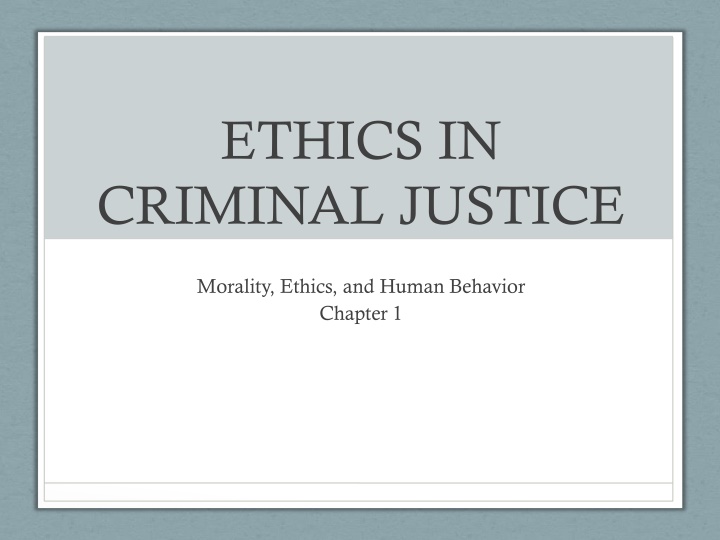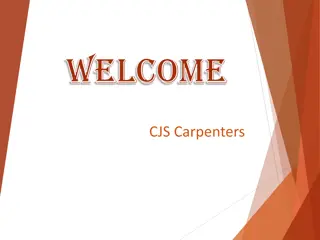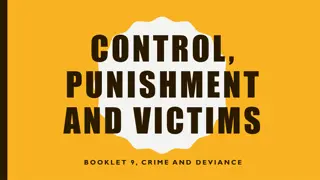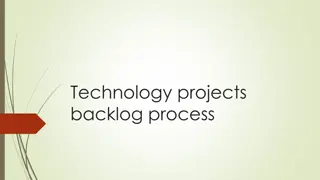
Ethics in Criminal Justice: Importance and Implications
Explore the significance of ethics in the criminal justice system, including ethical decision-making, issues vs. dilemmas, discretion, and the role of public servants in upholding ethical standards. Dive into the ethical foundations crucial for professionals in the field.
Download Presentation

Please find below an Image/Link to download the presentation.
The content on the website is provided AS IS for your information and personal use only. It may not be sold, licensed, or shared on other websites without obtaining consent from the author. If you encounter any issues during the download, it is possible that the publisher has removed the file from their server.
You are allowed to download the files provided on this website for personal or commercial use, subject to the condition that they are used lawfully. All files are the property of their respective owners.
The content on the website is provided AS IS for your information and personal use only. It may not be sold, licensed, or shared on other websites without obtaining consent from the author.
E N D
Presentation Transcript
ETHICS IN CRIMINAL JUSTICE Morality, Ethics, and Human Behavior Chapter 1
Purpose of this class To look at ethical decision making by criminal justice professionals.
Why is the study of ethics important? Develop critical thinking and analytical skills to understand aspects of criminal justice system. Ability to recognize quickly the ethical consequences of various actions and the moral principles involved. Ethical considerations are imperative to decisions involving discretion, force, and due process. Wholesight: Exploring issues with your heart as well as your mind.
Ethical issues v. Ethical dilemmas Issues Dilemmas
Ethical Issue Broad social questions concerning the government s social control mechanisms and the impact on those governed. Ex: what laws to pass Ex: What sentences to attach to certain crimes
Ethical Dilemma Situations in which one person must make a decision about what to do. Either the choice is unclear or the right choice will be difficult because of the costs involved. Ex: Power as governor to make a change, but strong opposition against it.
Discretion Professionals in the Criminal Justice system experience varying degrees of discretion, authority, and power.
Discretion Professionals in the Criminal Justice system experience varying degrees of discretion, authority, and power. Discretion: The authority to make a decision between two or more choices.
Public Servants What is a public servant?
Public Servants Someone who serves the public and is paid by the public
Class Discussion Why is a good ethical foundation especially important for public servants? What makes them so different from private employees?
Class Discussion What if you were given a promotion where you worked? How do you think this new authority might change you? Change how you interact with others at work?
Legislators Discretion Public believes legislator s discretion is unethically influenced by lobbyists rather than public good. Ex: Jack Abramoff
Police Officers Discretion Enforce laws made by legislators. Power to deprive people of their liberty. Power to decide that lethal force is warranted.
Prosecutors Discretion Prosecutors face the least public scrutiny. They have a great deal of discretion: Whom to prosecute How to prosecute Which charges to pursue/drop Which cases go to grand jury Whether to pursue the death penalty in homicide cases
Defense Attorneys Discretion Some similar ethical duties to prosecutors Unique duties: Encourage plea deal What evidence to utilize How to try the case Whether to encourage an appeal
Judges Discretion Judges possess incredible power. Accept or deny plea bargains Rules of evidence Sentencing
Correctional Officers Discretion Includes probation officers and prison officials Probation officers: Make recommendations in reports that affect whether an individual goes to prison. Prison officials: Make decisions that affect the individual s liberty. They decide to award or take away good time.
Question Why is the study of ethics important for criminal justice professionals?
Question Part of what is needed [for public servants] is a public sense of wisdom and good character: balanced perception and integrity. Integrity means wholeness in public and private life consisting of habits of justice, temperance, courage, compassion, honesty, and disdain for self pity. Is this asking too much of our public servants?
Morals and Ethics Morals: Ethics: Principles of right and wrong. The discipline of determining good and evil and defining moral duties. Conduct as an individual in other spheres of life Conduct in your profession
Duties Duties: Actions that an individual must perform to be considered moral. Ex: To obey the law
Duties Supererogatories: Actions that are commendable but are not required in order to be considered moral. Example: Good Samaritan saving a drowning child
Duties Imperfect duties: General duties one should uphold but no specific application as to when or how. Example: Generosity
Values Elements of desirability, worth, or importance. Values become clear when there is a choice to be made. Behavior is consistent with values.
Values Exercise Arrange these values in order of priority in your life Achievement Pleasure Emotional well-being Skill Knowledge Heath Physical appearance Love Religious faith Power Family Wealth Justice Honesty Recognition Loyalty
Values Values imply a choice or a judgment. If you were confronted with an opportunity to cheat on an exam, your values of success and honesty would be directly at odds.
Making Moral Judgments We make moral or ethical judgments all the time. We make choices knowing we can be judged as right or wrong.
Making Moral Judgments Acts that can be judged as ethical or unethical, moral or immoral involve 4 elements: (1) Acts that are (2) human and (3) of free will (4) that affect others
Making Moral Judgments 1. Act: Some act must have been performed. Not necessarily concerned about how people feel or what they think about the particular action.
Making Moral Judgments 2. Only human acts: Judgments are directed specifically to human behavior. No judgments to animals or natural disasters such as drought, famine or floods.
Making Moral Judgments 3. Free will: A person cannot be assigned moral culpability if they are not aware of the world around them to be able to decide rationally what is good or bad. Young and insane are exempt from responsibility.
Making Moral Judgments 4. Affects others: Only discuss moral or immoral behavior in cases where the behavior significantly affects others. Self-destructive behavior harms those who love us and who would be hurt by such actions.



